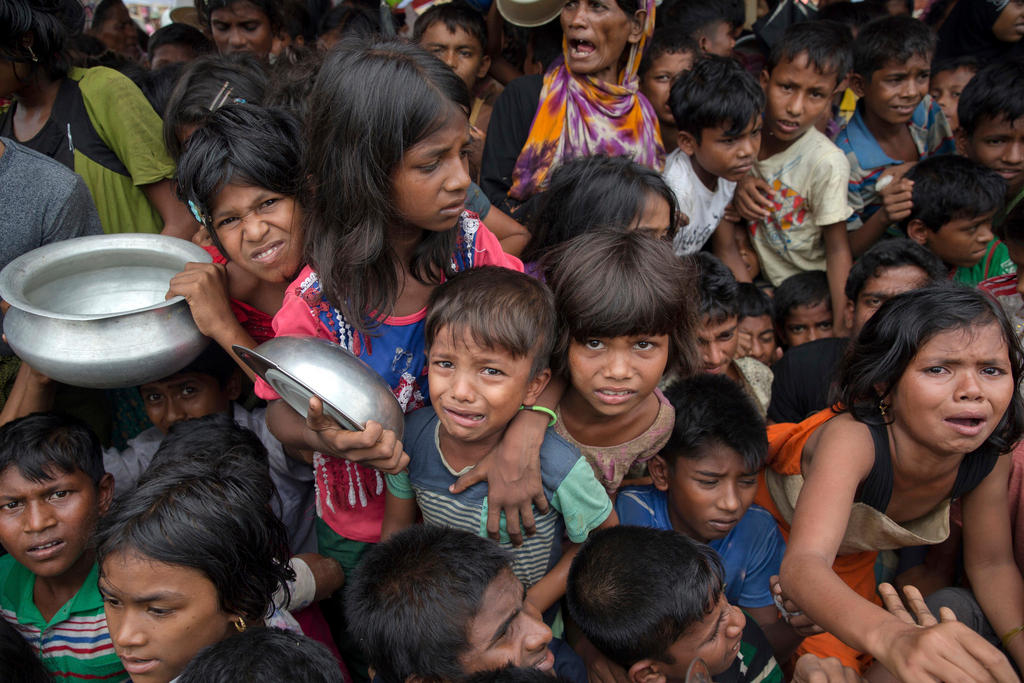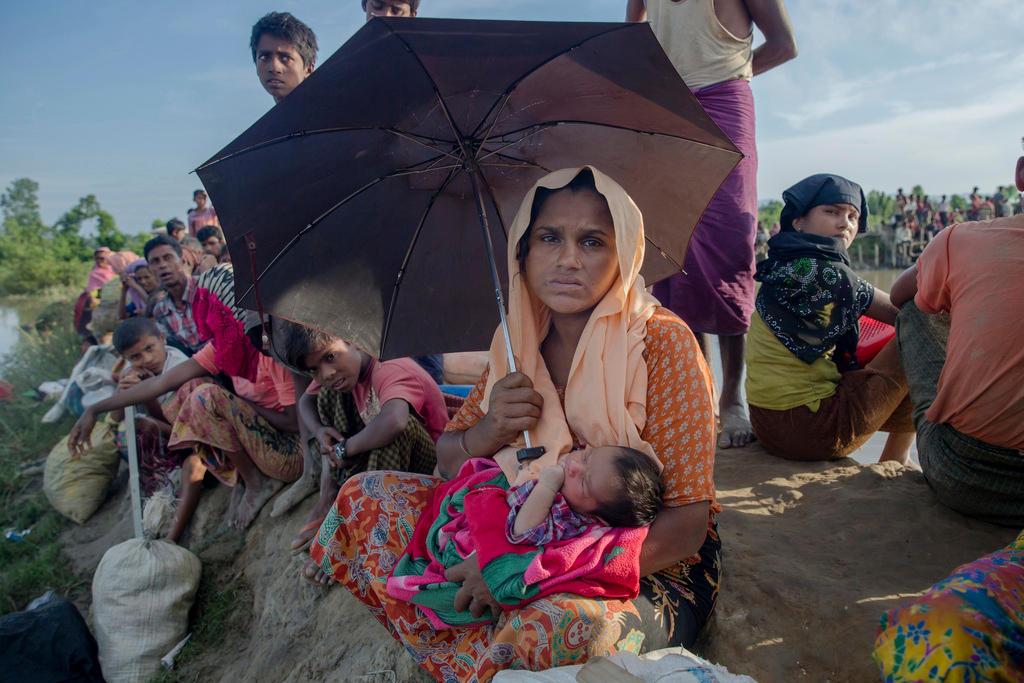Switzerland pledges extra funds to Rohingya crisis

Switzerland has announced additional money to help Rohingya refugees in Bangladesh, taking its total contribution to CHF8 million ($8.1 million). The United Nations in Geneva hosted a pledging conference on Monday to seek support for what it calls the fastest-growing refugee crisis in the world.
The Swiss foreign ministry said on MondayExternal link it was increasing its aid budget to CHF8 million to meet the growing humanitarian needs of Rohingya Muslim refugees. More than 600,000 – 60% of them children – have fled violence and insecurity in the northern Rakhine State in Myanmar since August 25, when the UN says the Myanmar army began a campaign of ethnic cleansing following insurgent attacks.
The refugee population in neighbouring Bangladeshi regions has now expanded to 809,000. Most Rohingya are stateless in Myanmar and many fled without papers.
“In view of the gigantic humanitarian needs, we’ve mobilised very quickly,” Switzerland’s top aid official, Manuel Bessler, told reporters in Geneva. “Ahead of my visit to Bangladesh three weeks ago we proposed CHF4 million. Afterwards, we talked about what more we could do, so we’ve mobilised CHF4 million in new money. On the other side of the border in Myanmar’s Rakhine State we’ve had an operation for some time and there we have a budget of CHF4.7 million.”
The Swiss money is going towards funding emergency operations by the UN High Commissioner for Refugees (UNHCR), the International Organization for Migration (IOM), the World Food Programme (WFP) and various NGOs.
Last month, Switzerland also delivered tents and other emergency supplies, and three experts from the Swiss Humanitarian Aid UnitExternal link are helping the IOM and UNICEF, the UN children’s fund, to set up reception centres and install sanitation facilities and systems for distributing drinking water.

More
More money please: the politics of UN pledging conferences
The UN says it needs $434 million (CHF427 million) to assist 1.2 million people, including new refugees, previous refugees and host communities who are living in cramped makeshift camps in the Cox’s Bazar region of Bangladesh (see box).
UN officials announced on Monday that pledges from 35 states had been made amounting to $340 million. Significant new money was announced by the government of Kuwait ($15 million), the European Union (€31 million (CHF35million)), the United Arab Emirates ($7 million), Denmark ($10 million), Sweden ($15 million), Saudi Arabia ($20 million) and Britain (£12 million (CHF15.6 million)). Other pledges are expected in the coming weeks.
‘Humanitarian nightmare’
Humanitarian officials agree that the needs in Bangladesh and Myanmar are colossal. Myanmar’s government dismisses accusations of ethnic cleansing, saying it has to tackle Rohingya insurgents, whom it accuses of starting fires and attacking civilians, as well as the security forces.
“During my visit to Bangladesh earlier this month, I heard heart-rending accounts of killings, arson, rape, torture and other abuse,” Mark LowcockExternal link, emergency relief coordinator and Under Secretary-General at the UN Office for the Coordination of Humanitarian Affairs told the donor meeting.
“The Secretary-General has called the situation a ‘human, humanitarian and human rights nightmare’. Children, women and men fleeing Myanmar are streaming into Bangladesh traumatised and destitute.”
Donor conference
The Pledging Conference for the Rohingya Refugee CrisisExternal link was co-organised by the UN agencies for migration (IOM) and refugees (UNHCR), the UN’s humanitarian coordination body (OCHA), the European Union and the government of Kuwait.
The needs of the UN-coordinated joint response planExternal link include: food assistance for more than 500,000 new arrivals; more than 100,000 emergency shelters; 25,000 emergency lavatories; 100,000 children require continued education; 55,000 pregnant women require emergency nutritional support; 58 million litres of safe water a day; 68,000 women require dignity supplies.
Last week, UNICEF said nearly 340,000 Rohingya childrenExternal link were living in squalid conditions in Bangladesh camps where they lack enough food, clean water and health care.
Humanitarian agencies and governments are still demanding access to northern Rakhine, where an unknown number of Rohingya remain despite UN reports that many villages and food stocks have been burnt.
Manuel Bessler said the scale of the crisis and the pressures were striking. “Imagine half a million people – more than the population of the city of Zurich – being displaced in the space of just a few weeks. There is a real feeling of crisis and emergency in every sector, especially hygiene and water. There are needs everywhere,” he said.
“No organisation or country can be prepared for a crisis that develops so quickly. There is certainly room for improvement. There are distribution points [in the camps] but there are not enough organisations on the spot – five or six UN agencies and about 20 NGOs for a crisis of half a million. It’s not enough.”
Search for a durable solution
Shameem Ahsan, Bangladesh’s ambassador to the UN in Geneva, told the donor meeting that the huge number of arrivals was ‘untenable’.
“This is the biggest exodus from a single country since the Rwandan genocide in 1994,” Ahsan said. He added that Bangladesh’s interior minister was in the Myanmar capital Yangon on Monday for talks to try to find a “durable solution”.
The UN insists that the origins of the crisis are in Myanmar and that a political solution must also be found in the southeast Asian state. On Monday, UN officials repeated their calls for an end to violence in northern Rakhine State, “unfettered” humanitarian access and the creation of conditions for refugees to return home.
Filippo Grandi, UN High Commissioner for Refugees, told journalists in Geneva that Myanmar and Bangladesh had begun talks on “repatriation”.
Any return must be “voluntary, safe and dignified” and conducive conditions have to be “recreated” in Rakhine, he said. “This must include a solution to the question of citizenship, or rather lack thereof for the Rohingya community,” Grandi said.
Earlier this month Switzerland hosted controversial talks with Myanmar’s top military brass.
“Switzerland’s aim is to act as a mediator and to reinforce dialogue, as it does in many crises,” Bessler commented, adding that humanitarian access and the return of refugees were two of the topics tackled in “animated discussions”.
The results of the Swiss talks are unclear, however. Bessler said the Myanmar officers “at least showed an interest” by participating.

In compliance with the JTI standards
More: SWI swissinfo.ch certified by the Journalism Trust Initiative










You can find an overview of ongoing debates with our journalists here . Please join us!
If you want to start a conversation about a topic raised in this article or want to report factual errors, email us at english@swissinfo.ch.